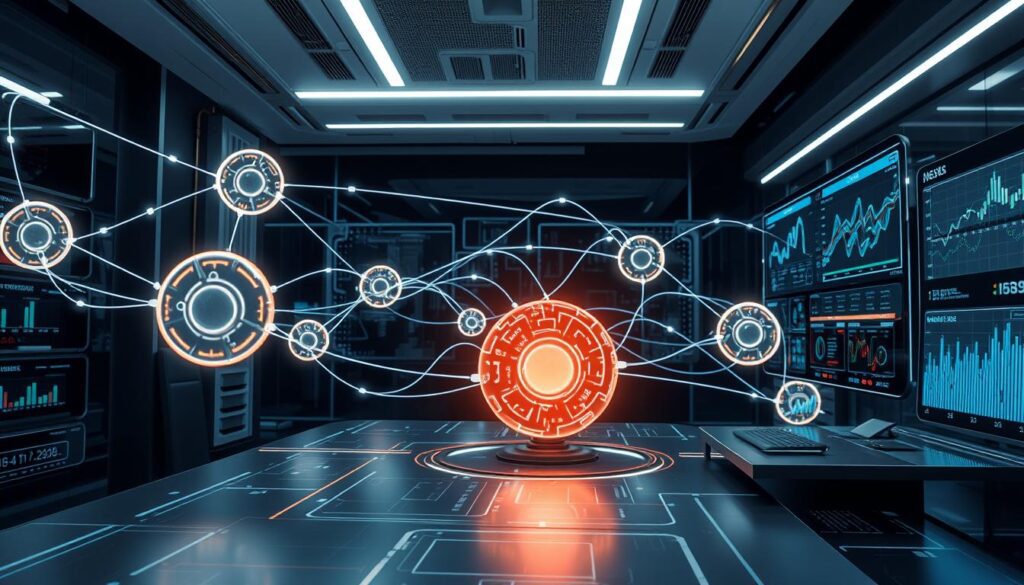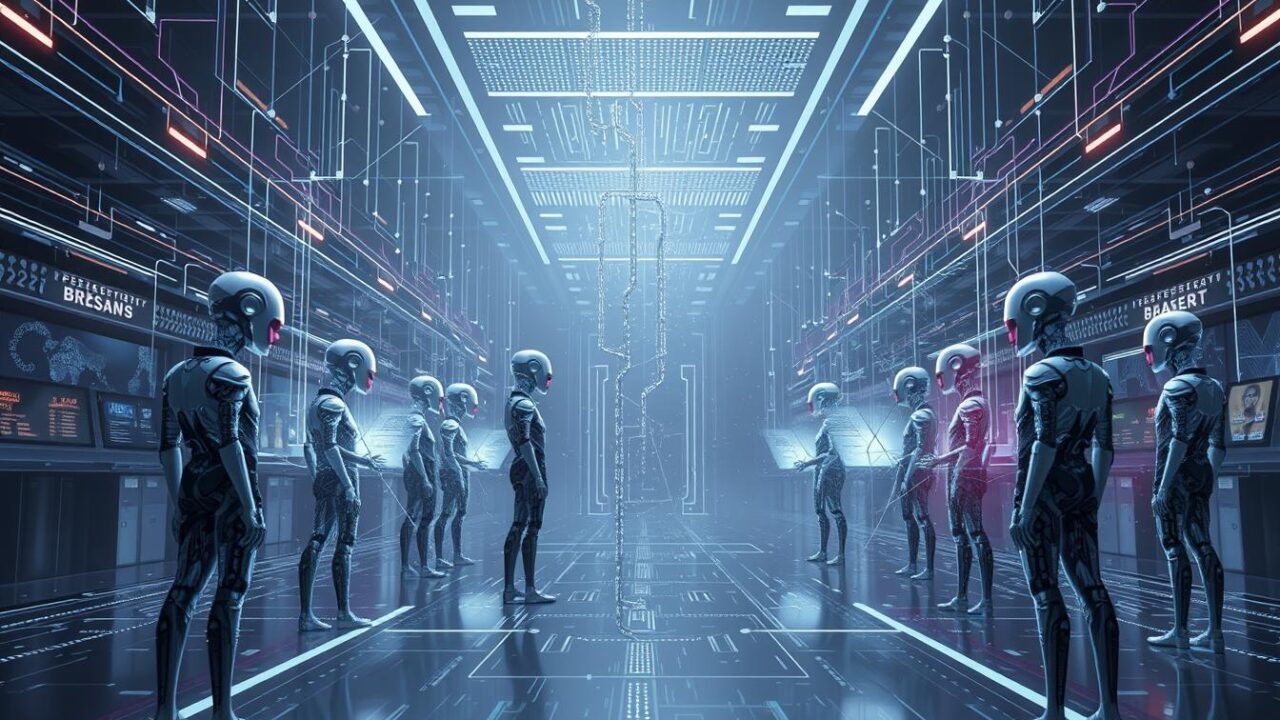The race to create AI agents is a huge challenge for tech giants, research labs, and startups. The market for autonomous AI is expected to hit $28.5 billion by 2028. But what are AI agents, and who will make money from them?
AI agents are a new kind of model that can work on their own. They can do tasks without needing a human, making things better and faster. They will change many fields like healthcare, education, and finance by making things more efficient and personal.
Big names like OpenAI, Anthropic, and Adept are leading the AI agent race. Startups like Imbue and Magic AI are also in the game. They’re not just competing on their tech. They’re also fighting to see who can best use data and tools to solve real problems for people.
Key Takeaways
- The global autonomous AI and autonomous agents market is projected to reach $28.5 billion by 2028.
- AI agents enable “agentic workflows” – loops that can run multiple steps without human involvement, leading to optimization and enhanced performance.
- Major players in the AI agent race include OpenAI, Anthropic, Adept, Imbue, and Magic AI, competing on both component quality and integration capabilities.
- AI agents have the potential to revolutionize industries by automating tasks, enhancing efficiency, and personalizing experiences.
- Understanding the components and competitive landscape of AI agents is crucial for businesses and individuals seeking to profit from this transformative technology.
The Race Toward AI Agents

The race to create the most advanced AI agents is intense. The winner could see a huge increase in global GDP. Companies are working hard to make the best AI models and solve real-world problems.
The Billion-Dollar Prize for Revolutionizing AI
The rewards for a groundbreaking AI agent are huge. Experts say the winner could earn billions. This has drawn big investments from top tech companies and startups.
The Key Players in the AI Agent Race
- OpenAI: This AI research company has raised over $13 billion, making it a top player in the ai agent race.
- Anthropic: With over $7.3 billion, Anthropic is a major player in ai agent development.
- Adept: This startup has $413 million in ai agent investment to develop its AI solutions.
- Imbue: Imbue has $220 million to advance in the ai agent startup field.
- Magic AI: Magic AI has $145 million to push its ai agent research and development.
These companies and others are racing to create the best AI agents. They use the latest ai agent competition to solve problems and grab a big market share.
“The AI agent race is a high-stakes competition with the potential for astronomical rewards. The winner could become the driving force behind the next technological revolution.”
What is an Agentic Workflow?

The business world is changing fast, thanks to AI assistants like ChatGPT. We’re seeing a new way of using artificial intelligence called agentic workflows. Unlike old language models, AI agents can plan, use tools, check results, and give answers. This process makes them better and more efficient.
From Language Models to AI Agents
The move from language models to AI agents is a big step forward. AI agents are now made for specific tasks. They can make choices on their own using machine learning and smart algorithms. They keep getting better at understanding markets, customers, and supply chains, changing how businesses work.
The Power of Agentic Workflows
Agentic workflows are more advanced than old language models. They break tasks into smaller steps and use tools to get things done better and faster. This way, AI agents can tackle real-world problems more effectively. They work together to solve big challenges, leading to better results and accuracy in many areas.
For instance, an app using an agentic workflow could find news on ecology and conservation for the Epworth League’s Ecology League Podcast. This shows how useful and practical this technology can be.
“Over the next year, a significant shift in AI application development can be expected, with Agentic Workflows driving innovation and growth across numerous industry sectors and job functions.”
Solving Real-World Problems with AI Agents

AI agents are great at solving real-world problems better than old ways. They might not always get the spotlight, but their real value is seen in how they help people and businesses.
Many companies are working to use AI agents in different fields. This includes making learning more personal in schools, finding diseases early in healthcare, and improving supply chains. AI agents can do lots of things, like automate tasks, find important data, and help people come up with new ideas.
- Agentic AI systems can work on their own a lot, which is good for tasks that need constant watching or quick choices.
- Agentic AI can give very personal experiences and solutions, getting better at meeting individual needs over time.
- Agentic AI can understand and talk in natural language, check if things are okay, discuss tasks, and even make decisions, making it easier for humans to work with them.
The uses of ai agent use cases are endless, with the chance to change many industries and solve big problems. AI agents could make things run smoother, save money, and offer more personal experiences. This would help both businesses and customers a lot.
“By the end of 2024, the projection is to have 500 million agents deployed across various industries. The goal by the end of 2025 is to see between 50 to 100 billion agents in operation, creating a vast ecosystem of intelligence.”
As the ai agent impact keeps growing, companies that use ai agent problem-solving will have a big edge in the ai agent industries of tomorrow.
The Five Components of AI Agent Systems
AI agents need five key parts to work well: data inputs, models, tools, interface, and AI glue. These parts work together to make a strong AI agent system. This system can handle complex tasks with great skill and accuracy.
Data Inputs: Fueling the Agent
Data inputs are the special data that an AI agent uses to learn and make decisions. This data is the base for the agent’s knowledge and choices.
Models: The Brain of the Agent
The models, like GPT-4, are the AI agent’s brain. Companies are racing to make the best models. The quality of the model affects how well the agent works.
Tools: Enhancing Agent Capabilities
Tools give the AI agent special skills, like the Code Interpreter tool from OpenAI. These tools help the agent do more tasks and face more challenges.
Interface: Integrating Agents into User Workflows
The interface is how the AI agent fits into users’ work. A good interface makes the agent easy to use and more effective.
AI Glue: Combining Components Effectively
The “AI glue” is the software that connects all parts of the AI agent system. It’s often overlooked but crucial for the system to work well.
By focusing on these five key areas, companies can create powerful AI agents. These agents can solve many problems and help innovate in different fields.
AI Agent Companies: Model-First vs. Product-First
In the fast-changing world of AI agents, two main approaches are emerging. Model-first startups and product-first companies are leading the way. They both aim to make a mark in the AI agent market, but they have different strategies.
The model-first AI agents are led by companies like OpenAI and Anthropic. They focus on creating advanced language models and AI architectures. They believe that perfecting the model is crucial for success.
On the other hand, the product-first AI agents are led by companies like Salesforce. They aim to make AI agents that solve real-world problems. Their goal is to create AI that works well in existing workflows and brings real benefits.
The ai agent market landscape is changing fast. Both model-first and product-first strategies are competing for the top spot. As the competition grows, the ai agent company strategies will shape the future of AI.
ai agents who profits what are they
AI agents are set to change the game, making big profits for those who use them right. A McKinsey report shows 60% of companies are already using AI. It says AI could add up to $15.7 trillion to the global economy by 2030.
So, who benefits from AI agents? These smart systems can understand, learn, and solve problems. They’re key in many industries, making businesses work better.
AI agents can make things run smoother, save money, and help people do better work. They can do tasks like data entry and scheduling. They also find trends in big data, helping companies make smart choices.
“AI agents are poised to be a game-changer, unlocking new waves of innovation and growth across industries.”
AI agents do more than save money. They make customer service better by talking to clients and giving personalized advice. This makes customers happier and more loyal, helping businesses grow.
As the AI agent market grows, companies that lead in AI will make a lot of money. Leaders like Salesforce are making AI easy to use in businesses.
In the future, AI agents will be everywhere, from finance to healthcare. Companies that use AI will do well in a tough market.
The AI agent market is set to grow fast, with a 20% CAGR from 2023 to 2030. More companies will use AI, leading to more innovation and profits.
The Competitive Landscape of AI Agents
The use of AI agents is growing fast, making the competition fierce. Companies are working hard to make AI agents better than humans in speed, cost, and reliability. It’s key for businesses to understand this to use AI agents for better efficiency and innovation.
Speed, Cost, and Reliability
AI agents must be much faster, cheaper, and more reliable than humans. They need to work quickly, with low costs, and always accurately. Companies are spending a lot on research to improve ai agent performance, ai agent speed, ai agent cost, and ai agent reliability.
Evaluating AI Agent Performance
It’s hard to measure how well AI agents do, as AI is always changing. Investors are watching how much money goes into AI companies to see their value. As we get better at ai agent evaluation, we’ll see clearer ways to compare AI agents.
“The race to develop the most advanced, cost-effective, and reliable AI agents is on, with companies jockeying for position in this rapidly evolving landscape.”
The Rise of AI Agents: Disrupting Industries
AI agents are changing many industries with their efficiency, scalability, and global reach. They can work non-stop, analyzing huge amounts of data and doing repetitive tasks fast. This is unlike humans, who get tired and need breaks.
AI agents work all day, every day, and can reach people all over the world. They make decisions based on data, improving personalization and business success. This lets humans focus on creative and strategic work, leading to more innovation and teamwork with machines.
Unparalleled Efficiency and Scalability
AI agents, like Google’s Gemini and OpenAI’s GPT-4, understand language well. They can grasp context, tone, and even sarcasm. This makes them very efficient and scalable in many areas, from managing supply chains to creating content.
24/7 Operation and Global Reach
AI agents work 24/7 without needing breaks. This means businesses can offer services any time, helping customers worldwide. Their ability to scale operations opens up new chances for growth.
The growth of AI agents is changing industries. It helps businesses improve efficiency, scalability, and global reach. This leads to big productivity gains and shakes up the market.
“AI agents represent the future of technology, offering unparalleled autonomy, adaptability, decision-making capabilities, and efficiency compared to traditional systems.”
AI Agents: Collaborative Partners, Not Replacements
AI agents won’t replace human workers, as some fear. Instead, they will work alongside us. They can handle routine tasks, letting humans do more creative and strategic work.
Unleashing Human Potential
Working with AI will lead to new discoveries and innovations. AI can help with quick idea generation and keeping content consistent. This means content creators can do more without needing more people.
Examples of AI Agent Applications
AI agents are making a big difference in education and healthcare. They help with personalized learning and early disease detection. In travel, they create custom itineraries based on what customers like.
AI agents are set to become our partners, not our replacements. As AI grows, more industries will use it to innovate and work more efficiently.
“The development of AI agents is described as a collaborative journey towards a future of intelligent assistance.”
Profiting from the AI Agent Boom
The power of AI agents is changing many industries. Smart investors and entrepreneurs are finding ways to make money from this new tech. Whether you want to invest in AI startups or create your own AI solutions, there are many chances to earn.
Investing in AI Agent Companies
Investing in AI companies is a good way to make money. A McKinsey report says 60% of companies are using AI. The global AI market is set to hit $15.7 trillion by 2030. By picking the right AI startups or big players, investors can make a lot of money.
Developing Your Own AI Agent Solutions
If you’re more into starting your own business, creating AI products is a great option. The World Economic Forum says AI will create 97 million jobs but also displace 85 million. This means there’s a big chance for innovation and success with AI.
Whether you invest in AI companies or start your own, knowing the latest AI news is key. Understanding the market and AI’s strengths can help you lead in the AI revolution. This way, you can make money from profiting from ai agents, investing in ai agent startups, building ai agent solutions, and finding many ai agent business opportunities.
“AI is not just the future – it’s the present. The companies and individuals who embrace this technology now will be the ones who thrive in the years to come.”
Conclusion
AI agents are changing how we use artificial intelligence. They are self-learning and can work on their own. This is making many industries, like education and healthcare, better.
AI agents make things more efficient and give us valuable insights. They could even help the global economy grow. This could lead to new discoveries and improvements.
But AI agents are not meant to replace us. They are meant to help us do our jobs better. The companies and people who use AI agents well will do well.
The future looks bright for those who use AI agents wisely. They can help us make progress and find new ways to do things.
This article shows how important AI agents are for the future. We need to use them wisely. They can change many areas of life and help the economy grow.
By understanding AI agents, we can use them to our advantage. This will help us shape the future of AI agents and make the most of them.
Source Links
- What Are AI Agents—And Who Profits From Them? – https://every.to/napkin-math/what-are-ai-agents-and-who-profits-from-them
- What are AI Agents: Types, Benefits, Applications, and Examples – https://www.signitysolutions.com/blog/ai-agents
- What Are AI Agents—And Who Profits From Them? – Every – https://emailsnest.com/brands/every/what-are-ai-agents-and-who-profits-from-them-255879
- New AI Agents May Soon Blur the Line Between Humans and Machines | PYMNTS.com – https://www.pymnts.com/artificial-intelligence-2/2024/new-ai-agents-may-soon-blur-the-line-between-humans-and-machines/
- Ask HN: Is anybody getting value from AI Agents? How so? – https://news.ycombinator.com/item?id=39886178
- What are AI Agents & Agentic Workflows? – https://www.codiste.com/ai-agents-and-agentic-workflows
- Introducing AI Agents and Agentic Workflows: The Future of AI Applications – https://www.linkedin.com/pulse/introducing-ai-agents-agentic-workflows-future-ken-rheingans-1rwce
- Agentic AI: The Next Big Breakthrough That’s Transforming Business And Technology – https://www.forbes.com/sites/bernardmarr/2024/09/06/agentic-ai-the-next-big-breakthrough-thats-transforming-business-and-technology/
- The Agentic Economy is Coming… – https://medium.com/@kyeg/the-agentic-economy-is-coming-ecf789a370f2
- What is an AI Agent? Characteristics, Advantages, Challenges, Applications – https://www.simform.com/blog/ai-agent/
- AI Agents: A Comprehensive Guide on Understanding & Implementing Them – https://www.lyzr.ai/blog/ai-agents/
- Early adopters are deploying AI agents in the enterprise now, with scaled adoption in 2025 – https://www.zdnet.com/article/what-is-the-future-of-the-ai-powered-agent-first-enterprise/
- Inside Agentforce: Creating AI Agents That Will Change Everything at Work – https://www.salesforce.com/news/stories/building-business-ai-agents/
- CountingWorks PRO | What is an AI Agent and How Can It Help My Tax Practice? – https://www.countingworkspro.com/blog/what-is-an-ai-agent-and-how-can-it-help-my-tax-practice
- What Are AI Agents? – https://www.salesforce.com/agentforce/what-are-ai-agents/
- AI Agents: Evolution, Architecture | Rapid Innovation – https://www.rapidinnovation.io/post/what-are-ai-agents-agents-in-artificial-intelligence-explained
- AI Agents are disrupting automation: Current approaches, market solutions and recommendations – https://www.insightpartners.com/ideas/ai-agents-disrupting-automation/
- How AI Agents Transform Enterprises: Key Use Cases & Benefits – https://www.solulab.com/ai-agent-for-enterprises/
- The Rise of AI Agents: Harnessing Autonomous AI to Drive Business Results – https://medium.com/@davidsweenor/the-rise-of-ai-agents-harnessing-autonomous-ai-to-drive-business-results-b28a6c33607e
- The Rise of AI Agents Moving Beyond Co-Pilots – https://www.linkedin.com/pulse/rise-ai-agents-moving-beyond-co-pilots-neeraj-sabharwal-l7fnc
- AI Agents: The Dawn of Proactive, Personalized Intelligence? – https://www.linkedin.com/pulse/ai-agents-dawn-proactive-personalized-intelligence-anna-naveed-lpjjc
- AI agents will transform business processes — and magnify risks – https://www.cio.com/article/3489045/ai-agents-will-transform-business-processes-and-magnify-risks.html
- Relevance-Site – https://relevanceai.com/agent-templates-tasks/content-creation-ai-agents
- How AI Agents are Shaping a Profitable Future: What You Need to Know – https://medium.com/@Nontechpreneur/ai-agents-the-profitable-future-you-cant-ignore-unlock-profitable-opportunities-now-f1687eeac3c8
- Want to Profit From the Artificial Intelligence (AI) Boom? Buy Meta Platforms Stock. | The Motley Fool – https://www.fool.com/investing/2024/08/02/profit-artificial-intelligence-ai-buy-meta-stock/
- The Power of AI agents in E-Commerce – https://konecto.io/blog/the-power-of-ai-agents-in-e-commerce/
- 6 Types of AI Agents: Exploring the Future of Intelligent Machines – https://www.simform.com/blog/types-of-ai-agents/
- Agentic AI: When to Choose AI Agents vs GPTs for SEO and Why – https://wordlift.io/blog/en/agentic-ai/
Want to hire me as a Consultant? Head to Channel as a Service and book a meeting.

